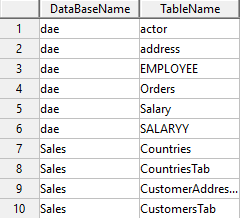Databases often have standard columns. Examples of such standard columns can be id, modified_date, created_by or row_version.
Query below finds all tables that do not have a 'last_update' column.
Query
SELECT tab.DatabaseName,
tab.TableName
FROM DBC.TablesV tab
LEFT JOIN DBC.ColumnsV col
ON tab.DatabaseName = col.DatabaseName
AND tab.TableName = col.TableName
AND col.ColumnName = 'id' -- provide column name here
WHERE col. ColumnName is null
AND tab.DatabaseName NOT IN ('All', 'Crashdumps', 'DBC', 'dbcmngr',
'Default', 'External_AP', 'EXTUSER', 'LockLogShredder', 'PUBLIC',
'Sys_Calendar', 'SysAdmin', 'SYSBAR', 'SYSJDBC', 'SYSLIB',
'SystemFe', 'SYSUDTLIB', 'SYSUIF', 'TD_SERVER_DB', 'TDStats',
'TD_SYSGPL', 'TD_SYSXML', 'TDMaps', 'TDPUSER', 'TDQCD',
'tdwm', 'SQLJ', 'TD_SYSFNLIB', 'SYSSPATIAL')
AND tab.TableKind = 'T'
ORDER BY tab.DatabaseName,
tab.TableName;
Columns
- DatabaseName - name of database
- TableName - name of table
Rows
- One row represents a table
- Scope of rows: all found tables which don't have column with provided column name
- Ordered by database name, table name
Sample results
These tables do not have a 'id' column.












 Bart Gawrych
Bart Gawrych